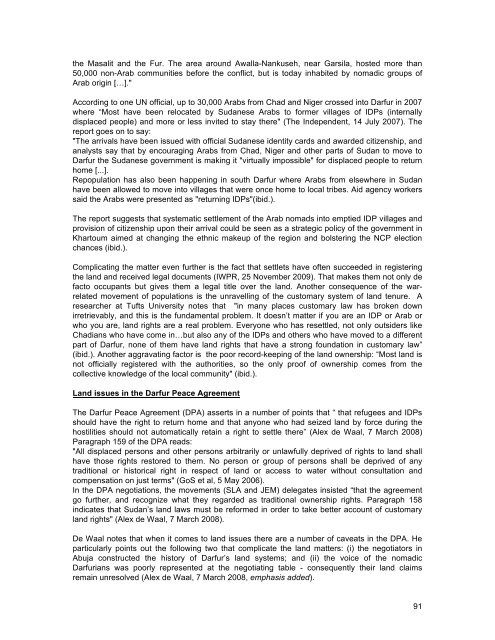SUDAN: Durable solutions elusive as southern IDPs return and ...
SUDAN: Durable solutions elusive as southern IDPs return and ...
SUDAN: Durable solutions elusive as southern IDPs return and ...
Create successful ePaper yourself
Turn your PDF publications into a flip-book with our unique Google optimized e-Paper software.
the M<strong>as</strong>alit <strong>and</strong> the Fur. The area around Awalla-Nankuseh, near Garsila, hosted more than<br />
50,000 non-Arab communities before the conflict, but is today inhabited by nomadic groups of<br />
Arab origin […]."<br />
According to one UN official, up to 30,000 Arabs from Chad <strong>and</strong> Niger crossed into Darfur in 2007<br />
where “Most have been relocated by Sudanese Arabs to former villages of <strong>IDPs</strong> (internally<br />
displaced people) <strong>and</strong> more or less invited to stay there" (The Independent, 14 July 2007). The<br />
report goes on to say:<br />
"The arrivals have been issued with official Sudanese identity cards <strong>and</strong> awarded citizenship, <strong>and</strong><br />
analysts say that by encouraging Arabs from Chad, Niger <strong>and</strong> other parts of Sudan to move to<br />
Darfur the Sudanese government is making it "virtually impossible" for displaced people to <strong>return</strong><br />
home [...].<br />
Repopulation h<strong>as</strong> also been happening in south Darfur where Arabs from elsewhere in Sudan<br />
have been allowed to move into villages that were once home to local tribes. Aid agency workers<br />
said the Arabs were presented <strong>as</strong> "<strong>return</strong>ing <strong>IDPs</strong>"(ibid.).<br />
The report suggests that systematic settlement of the Arab nomads into emptied IDP villages <strong>and</strong><br />
provision of citizenship upon their arrival could be seen <strong>as</strong> a strategic policy of the government in<br />
Khartoum aimed at changing the ethnic makeup of the region <strong>and</strong> bolstering the NCP election<br />
chances (ibid.).<br />
Complicating the matter even further is the fact that settlets have often succeeded in registering<br />
the l<strong>and</strong> <strong>and</strong> received legal documents (IWPR, 25 November 2009). That makes them not only de<br />
facto occupants but gives them a legal title over the l<strong>and</strong>. Another consequence of the warrelated<br />
movement of populations is the unravelling of the customary system of l<strong>and</strong> tenure. A<br />
researcher at Tufts University notes that "in many places customary law h<strong>as</strong> broken down<br />
irretrievably, <strong>and</strong> this is the fundamental problem. It doesn’t matter if you are an IDP or Arab or<br />
who you are, l<strong>and</strong> rights are a real problem. Everyone who h<strong>as</strong> resettled, not only outsiders like<br />
Chadians who have come in…but also any of the <strong>IDPs</strong> <strong>and</strong> others who have moved to a different<br />
part of Darfur, none of them have l<strong>and</strong> rights that have a strong foundation in customary law”<br />
(ibid.). Another aggravating factor is the poor record-keeping of the l<strong>and</strong> ownership: “Most l<strong>and</strong> is<br />
not officially registered with the authorities, so the only proof of ownership comes from the<br />
collective knowledge of the local community" (ibid.).<br />
L<strong>and</strong> issues in the Darfur Peace Agreement<br />
The Darfur Peace Agreement (DPA) <strong>as</strong>serts in a number of points that “ that refugees <strong>and</strong> <strong>IDPs</strong><br />
should have the right to <strong>return</strong> home <strong>and</strong> that anyone who had seized l<strong>and</strong> by force during the<br />
hostilities should not automatically retain a right to settle there” (Alex de Waal, 7 March 2008)<br />
Paragraph 159 of the DPA reads:<br />
"All displaced persons <strong>and</strong> other persons arbitrarily or unlawfully deprived of rights to l<strong>and</strong> shall<br />
have those rights restored to them. No person or group of persons shall be deprived of any<br />
traditional or historical right in respect of l<strong>and</strong> or access to water without consultation <strong>and</strong><br />
compensation on just terms" (GoS et al, 5 May 2006).<br />
In the DPA negotiations, the movements (SLA <strong>and</strong> JEM) delegates insisted “that the agreement<br />
go further, <strong>and</strong> recognize what they regarded <strong>as</strong> traditional ownership rights. Paragraph 158<br />
indicates that Sudan’s l<strong>and</strong> laws must be reformed in order to take better account of customary<br />
l<strong>and</strong> rights" (Alex de Waal, 7 March 2008).<br />
De Waal notes that when it comes to l<strong>and</strong> issues there are a number of caveats in the DPA. He<br />
particularly points out the following two that complicate the l<strong>and</strong> matters: (i) the negotiators in<br />
Abuja constructed the history of Darfur’s l<strong>and</strong> systems; <strong>and</strong> (ii) the voice of the nomadic<br />
Darfurians w<strong>as</strong> poorly represented at the negotiating table - consequently their l<strong>and</strong> claims<br />
remain unresolved (Alex de Waal, 7 March 2008, emph<strong>as</strong>is added).<br />
91
















